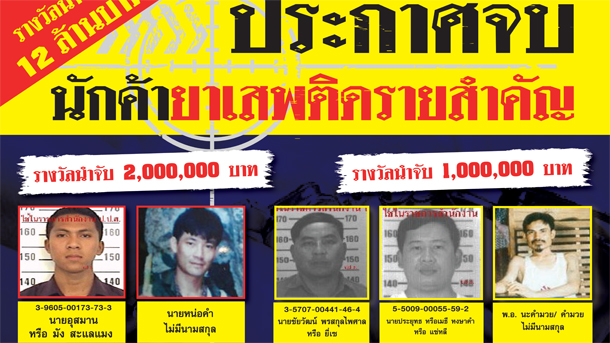Saw Lah Pwe, the leader of a breakaway faction of the Democratic Karen Buddhist Army (DKBA), has been named one of three Burmese nationals on Thailand’s list of most-wanted drug traffickers.
On April 20, Thai Deputy Prime Minister Chalerm Yubamrung announced that the Office of the Narcotics Control Board (ONCB) was offering 12 million baht (US $388,000) in rewards for the capture of the 25 of the country’s most-wanted drug dealers.
The ONCB website provides photos of the alleged drug traffickers, as well as the phone number of a 24-hour hotline for those with information on their whereabouts.
The highest reward is for Naw Kham, the notorious leader of a private militia on the Mekong River that for the past five years has terrorized the crews of vessels—almost invariably Chinese cargo ships—sailing a narrow stretch of the river between Laos and Burma.
In addition to the 2 million baht ($64,000) on Naw Kham’s head, rewards of 1 million baht ($32,000) each have been offered for two other Burmese nationals—Saw Lah Pwe and Yi Say.
Saw Lah Pwe—who is identified on the poster by his well-known nickname, Na Kham Mwe, meaning “Mustache”—vehemently denied the charges against him.
“I never do [drug trafficking]. I have no desire to be rich in that way. They [Thai authorities] hurt not only my image, but also the image of my people and my state. They look down on us,” the DKBA Brigade 5 commander told The Irrawaddy on Wednesday.
He said the ONCB was welcome to come to his area in southern Karen State to investigate the charges against him.
“They can come here. I will not attack or harm them. I will be responsible for everything. If I am guilty, I will face legal action. I will even go to the International Criminal Court if necessary,” he said.
He added, however, that if the allegations were proven to be false, those who accused him should face criminal proceedings.
Without naming specific individuals, he suggested that the allegations may have originated with Thai businessmen or other DKBA officials.
In late 2010, Saw Lah Pwe broke away from the rest of the DKBA with around a quarter of its estimated 6,000 troops. In November 2011, he reached a ceasefire agreement with the Burmese authorities.
















